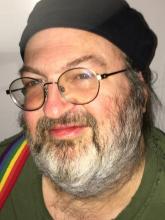Iain Edgewater
Note: I went on de facto leave of absence in fall 2022, primarily to attend to ongoing family matters; I expect to re-enter the MA program in the summer of 2024 on a part-time basis.
Despite listing too many research interests here, they cluster into a small handful of themes:
*** Intersections of linguistic behavior, how linguistic forms come to mean things socially, and "inner" aspects of the mind.
*** How such matters play out diachronically through language change. Here, the areas that interest me the most are morphology and semantics, but the entire continuum between those areas (speaking disciplinarily, since I'm not convinced it's necessarily a "continuum" in reality) is of broad interest.
*** Translation studies, including prospects for improving automated translation, as well as classic literary translation studies.
My master's thesis will center on a particular issue from Indonesian morphophonology. I am also interested in the ethnohistory of particular forms of language change in the Pacific Northwest, along with a variety of other potential projects.
In varying proportions, I've been working independently on learning Indonesian, Latin, and Cornish (the language of [some of] my ancestors), plus brushing up on my long-dormant Russian, and beefing up my computational skills a bit. I hope to be back at UK full-time as soon as possible, but until then:
== Persiapkan hari ini sebaik-baiknya, untuk menghadapi hari esok yang baru. ==
Education:
MA (date expected tbd), Linguistics - University of Kentucky
+ Indonesian language study at U. of Hawai'i Mānoa, fall 2022
+ Ongoing independent work on Indonesian, Lushootseed,
Cornish, and Latin
MA, 1993 (& ABD 1994), Anthropology - Emory University
+ Vietnamese language study at multiple SEASSI programs, and
through CIEE in Hanoi, 1991-1993.
BA, 1990, Anthropology and Psychology - University of Kentucky - ΦΒΚ
Additional non-degree coursework in mathematics, computer science, information technology, and English, Edmonds Community College, 2017-2020.
~~~
Teaching experience:
*** Instructor of record (Type I teaching assistant), 2021-2022
- University of Kentucky, Department of Writing, Rhetoric, and Digital Studies
(Technical Writing x2/2 semesters)
*** Instructor and Tutor, 2004-2007
- Princeton Review Northwest (Seattle region)
(LSAT, MCAT)
*** Adjunct instructor of anthropology, 1995-1996
- Seattle University, Department of Sociology
(Intro to Cultural Anthropology *4, Culture and Personality, Northwest Coast Peoples)
*** Co-instructor [with Dr Fredrik Barth and Dr Alexander Hinton], 1993
- Emory University, Department of Anthropology
(Southeast Asian Cultures)
*** Teaching assistant / lab instructor
[with Dr Charles Nuckolls, Dr Michael Harkin, Dr Euclid O. Smith], 1991-1992, 1994
- Emory University, Department of Anthropology
(Intro to Cultural Anthropology *2, Intro to Physical Anthropology [lab])
~~~
Selected publications and presentations:
*** Edgewater, I. D. (2022). Toward deep motivation as a factor in language change: Notes on the nasal->stop transition in Lushootseed (Puget Salish). Paper given at the 10th Annual Central Kentucky Linguistics Conference (CKLiC), April 2022, Lexington, Kentucky.
*** Edgewater, I. D. (1999). Music hath charms...: Fragments toward constructionist biocultural theory, with attention to the relationship of "music" and "emotion". In A. L. Hinton (Ed.), Biocultural Approaches to the Emotions (Pp. 153-181). Cambridge University Press.


